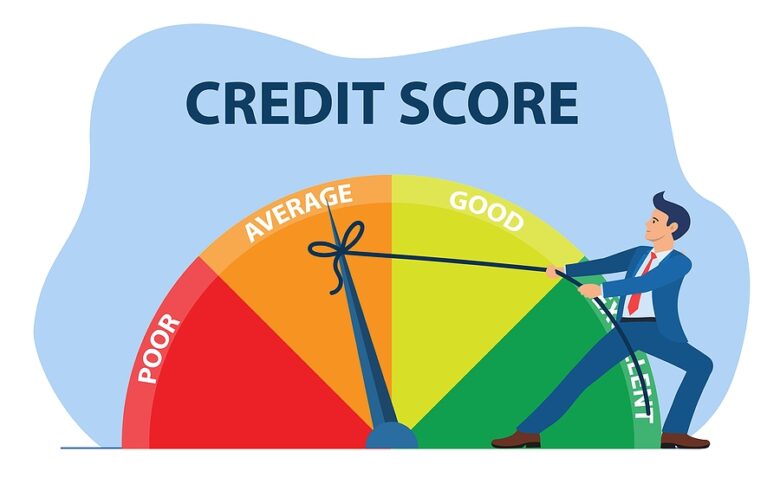One of the most crucial but frequently misunderstood concepts in personal finance is the credit score. Most people know they have a credit score but don’t know what it is or how it affects their finances. Credit scores are a number that represents your creditworthiness or likelihood of repaying borrowed money. Banks, lenders, and landlords use it to assess your financial stability. Your credit score will determine how many financial opportunities are available for you. The lower your credit score is, the harder it may be for you to get a loan, a credit card, or favorable rates. Making informed financial decisions requires an understanding of credit scores.
What is a credit score?
Credit scores are three-digit numbers that sum up your credit history. They range between 300 and 800. The score is based on the borrower’s borrowing and repayment habits. Your credit score is based on your debt, bill payment history, and credit usage. The higher your score, the more responsible and reliable you seem to lenders. Low scores can indicate financial difficulties or bad repayment habits. Such behaviors may make lenders reluctant to approve your application. Think of your credit score as the accumulation of your financial reputation over time.
Credit Scores Calculated
Credit scoring models use several key factors, even if you don’t see the exact formula. Lenders want to know that you are a reliable payer. Credit utilization is another important factor. Your credit history, including how long you’ve had your accounts, affects your score. The number is also affected by new credit applications, the type of credit that you use (such as loans, credit cards, or mortgages), and any recent credit inquiries. These elements collectively provide insight into your borrowing habits.
What is a Good Credit Score?
A high credit score provides numerous opportunities in the financial realm. Having a higher credit score enhances your likelihood of receiving approval for loans, credit cards, and reduced interest rates. You will save money in the long run because of lower interest rates. Renting apartments is easier with a favorable credit score, since many landlords will check your credit history prior to approving you. Some employers will review credit reports during the hiring process. A high credit score is a signal to others that you’re financially responsible and trustworthy.
Consequences Of A Low Credit Score
A low credit score, on the other hand, can have severe consequences. Your loan or credit application may be denied if your credit score is low. If you’re approved, your borrowing costs will increase due to higher interest rates. Low scores can limit your housing options or force you to pay higher security deposits. You may not be able to get certain jobs that require financial responsibility. A low credit score will make your life pricier over time and limit your financial flexibility.
Credit Scores: Misconceptions
Many people have misconceptions about credit scores. It is a myth that checking your credit score can lower it. Personal checks are not considered rigorous inquiries and do not have any effect. Some people think that carrying a credit card balance will improve their scores. In reality, it is best to pay off the balance in full. Some individuals also hold the belief that damaged credit scores are irreversible. However, anyone can repair their score with good behavior and consistent actions. It is crucial to understand these myths so you don’t unintentionally hurt your financial progress.
Building Financial Awareness
Understanding credit scores is a part of developing financial awareness. Credit scores reflect how you handle debt and repayments, but they also highlight the importance of planning and responsibility. You become more aware of your choices by paying attention to your credit score. This awareness will encourage you to spend and save wisely. You can also think about the impact your decisions will have on future generations. It takes time to build a strong credit score, but maintaining it will encourage better financial habits in all areas of life.
Conclusion
Credit scores are a major factor in determining financial opportunities and obstacles. Credit scores can influence your ability to borrow money, interest rates, and how much you pay for services such as insurance or utilities. A high score will bring you lower costs and more flexibility. On the other hand, a low score can restrict your life and make it pricier. Credit scores are not permanently fixed, and anyone can improve them with a consistent effort. Understanding credit scores, their calculation, and the impact they have on your financial future will help you take charge of it and unlock new opportunities.
FAQs
1. What is the importance of a credit score?
Credit scores are important, as they determine how you can borrow cash, the interest rate you receive, and everyday expenses such as insurance or utilities.
2. How do you determine a credit score that is acceptable?
A score of 700 or higher is generally considered good. Higher scores are associated with better financial opportunities and lower costs.
3. Can I improve my credit score quickly?
It takes time to improve your credit score, but paying on time and reducing your debt can help.
4. Does checking your credit score affect it?
Checking your score will not lower it. Only serious inquiries, like when lenders verify loan approval, can temporarily lower your score.
5. What will happen if I don’t have a credit score?
It may be difficult to access credit or borrow money if you don’t have a history of excellent credit. You can establish credit scores by responsibly using a credit card, loan, or credit card.



